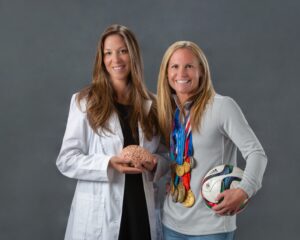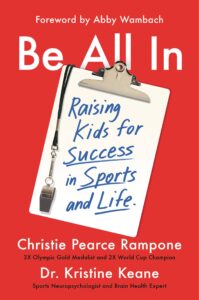Be All In: Raising Kids for Success in Sports and Life by Christie Pearce Rampone and Dr. Kristine Keane (Book Excerpt)
 Giving Honest Feedback
Giving Honest Feedback
It is so hard to give negative feedback, especially to our children. Research on management consistently shows that leaders tend to avoid giving feedback, especially negative or corrective feedback.2 This holds true for parenting as well. Parents are afraid of hurting their children’s feelings or doing damage to their self-esteem. On the flip side, they are afraid of inflating a false sense of pride and fostering cockiness or self-absorption.
Positive reinforcement assists in the development of children’s self-esteem and self-worth. Feelings of safety and security aid the development of internal models needed for tackling problems and handling adversity. Children need both rewards and ramifications to perform well. Indeed, bad behavior brings consequences, and parents need to be the first line of defense for teaching that lesson as well. Christie recalls that teaching accountability was one of her toughest tasks as head coach of Sky Blue FC in 2009, during their run to winning the Women’s Professional Soccer national title.
A year after the US National Women’s Team won gold at the Beijing 2008 Olympics, we were on a high. Natasha Kai was a key member of that team. She had so much talent and could be relied upon to score all types of goals for us. When she was on her game, she was incredible.
Natasha played for me on Sky Blue FC in 2009 and, naturally, was one of our big names. Even though she had been starting every game, she was not performing to her capability. When I was appointed coach midseason, I realized that I had to have a very tough conversation with Natasha. Understand this: at the time, Natasha was one of my closest friends. She was actually living with me! But, despite our friendship, I knew that she needed to be held to the same standard as everyone else. It didn’t matter if she was considered a big name. If she wasn’t playing to her potential, she wouldn’t be starting. This conversation with Tasha was difficult; so was subsequently pulling her from her starting position. But I knew—as her coach and teammate—that I would be doing her and her teammates a disservice by failing to address her play or hold her accountable.
We went into the playoffs with Tasha, one of our main attacking threats, serving as a substitute player. I was hoping that subbing her out would be her wake-up call.
Tasha was struggling with her eating habits off the field. She was not giving herself enough nutrition to last a ninety-minute game. We talked about it often. Since she couldn’t last for ninety minutes, I would sub her in only at the end. I needed to reduce her playing time so she could be more effective on the field. I could’ve coddled her and let her play, and I wanted to because she was one of my best friends. Tasha is a phenomenal soccer player and an even more amazing person. She had all the right intentions, but I knew I had to pull the plug on her playing. If I didn’t, I would have hurt her more.
Eventually, Tasha realized that she was coasting through games without performing, and that it was no longer acceptable. As the team progressed to the championship game, Tasha won back her starting position. She scored one of the team’s most vital goals that season. I held her accountable for the team’s expectations, and Tasha eventually held herself accountable for the same. She made a huge contribution to our success. In the end, not only did Tasha forgive me, but she thanked me for my part in her success.
Remaining Grounded in Reality
Accountability isn’t about an athlete’s taking the blame for a mistake or for a loss. It’s not about a declaration of guilt or a confession of sin. Accountability is simply about taking responsibility for an outcome. It is being aware of how your own actions affect the outcome of the team.
At home, parents should focus on how their child’s behaviors impact their family, siblings, or friends. Take a look at how you handle disputes between siblings or conflicts with your child and their peers. Do you let them fight it out? Do you have a tendency to blame your child’s friends?
Regardless of whose “fault” it is, the reality of every situation is that everyone involved has a role. Use these experiences to keep your child grounded in their own reality. What part did they play? Step back to evaluate the situation and ask, what do they think of their own behavior? How did it contribute to the escalation of the circumstances? You can teach your child to regularly look for their role in every situation. In doing so, your child will develop the ability to look for solutions, not problems. Key to the development of accountability is the ability to look for results. If your child is accustomed to getting caught up in problems, this will ultimately hinder them on the field.
For the 2012 London Olympics, Pia Sundhage was the coach of the US Women’s National Team. She was a terrific coach and someone I really admired and loved to play for. Coach Pia loved to have positive vibes around the team at all times and always worked on ensuring that the energy was right—whether that was on the field, in the locker room, or in the hotel. That bled into the video room too. During our video analysis sessions, Pia would never share many negative clips. She didn’t want to hurt her players’ confidence.
I wasn’t used to this. I always felt that video helped me remain accountable for my performance. Nobody likes to see themselves fail or make mistakes in front of their teammates; however, I learned to take my ego and emotion out of the equation and use the video review to help me grow. I didn’t want to repeat those same mistakes. I remember one particular game when I wasn’t happy with my performance. I knew that I needed to own my mistakes to improve and help contribute to the team. Video review, always a key tool in my development as a player, felt even more important now that I’d been named team captain.
When the next day’s video session began, I was prepared to see my face and feet all over the footage. I was ready to accept these mistakes and move on. However, not one of my clips made it into the team video review. Had I really played that poorly after all? Was it all in my head?
I made sure to get access to a laptop with my video clips, even though it wasn’t something Coach Pia required me to do. I felt the need to be accountable. I needed to ground myself in my own reality.
We can’t, and shouldn’t, realistically hold our children accountable for everything that happens on the field. Many parents feel the need to hold their kids accountable for scoring or for not surrendering goals or points. However, playing sports is not all about scoring. In some cases, a coach may not put your child in a position to score. Sometimes your child may be up against superior competition. Sometimes whole teams have bad days or are out of rhythm, so there aren’t many scoring chances. In cases like these, consider holding your child accountable for values and personal attributes instead.
Ultimately, your focus should be on big-picture concepts like productivity, supporting teammates, attitude and effort, and turning effective training into good performance. The goal or the win should be considered a child’s reward for the work, the fun, and the connections made with teammates. It’s the icing on the cake.
Author Bios:
Christie Pearce Rampone is the most decorated American professional soccer player of all time. She has played in five FIFA Women’s World Cups, winning in 1999 and 2015. In addition, she is a four-time Olympian and a three-time Olympic gold medalist. Currently, Pearce Rampone is an active speaker, coach, and sports commentator. She is a sports mom of two girls, and has coached professional, high school and club soccer teams, as well as youth basketball teams.
Kristine Keane, Psy.D. is a neuropsychologist who has been working with professional athletes, physicians, and mental health clinicians for the past twenty years. Dr. Keane is the owner, developer, and clinical director of two multi-specialty neuropsychological private practices and a Clinical Director of the Neuroscience Concussion Program at Hackensack Meridian Health. She is also the sports mom of two boys and a girl, who play soccer, basketball, and run track.

Excerpted from BE ALL IN: RAISING KIDS FOR SUCCESS IN SPORTS AND IN LIFE by Christie Pearce Rampone and Dr. Kristine Keane. Copyright © 2020 by Christie Pearce Rampone and Kristine C. Keane, Psy.D. Reprinted with permission of Grand Central Publishing. All rights reserved.
Tags: be all in, childhood, christie pearce rampone, dr. kristine c keane, having a family, having kids, parenting, raising kids for success in sports and life















